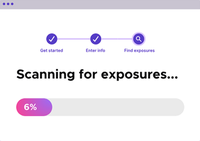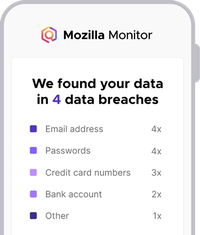How to Stop Spam Calls, Texts, and Emails by Removing Your Personal Info Online
Tired of Spam Calls, Texts, and Emails? Here’s Why It’s Happening and How to Stop It
If you feel like your phone never stops buzzing with robocalls, scam texts, or junk emails, you’re not alone. Spam is on the rise, and it’s not just annoying. It can be dangerous.
In 2024 alone, over 56 billion robocalls were made in the U.S.¹ That’s more than 150 million spam calls every day. And email isn't any safer. A staggering 90% of all emails are now spam, with more than half involving phishing or outright scams².

So, where do scammers get your personal information?
The answer often lies in people search sites, also known as data brokers. These sites publish and sell your personal details, making it easier than ever for scammers to reach you.
What Kind of Personal Info Is Out There?
Many people are surprised to learn just how much of their personal information is publicly available online. Here’s what scammers can easily find on people search sites and how they use it to target you:
- Your Full Name: Scammers use your name to make messages and calls feel more personal and legitimate. It’s especially effective when they’re pretending to be a trusted source like a bank, the IRS, or a law enforcement agency.
- Your Phone Number: This is how scammers reach you through robocalls and scam texts. They also use tactics like “neighbor spoofing,” where they fake a number with your area code so it looks local and familiar.
- Your Email Address: Used in phishing attempts and hacking schemes, especially spear phishing. Spear phishing is a highly targeted scam where the attacker uses personal information to craft convincing emails that look like they’re from someone you know or trust. The goal is to get you to click a malicious link or hand over sensitive information.
- Names of Your Family Members: Scammers use this to make their messages feel urgent and emotional. For example, they might claim a loved one has been arrested abroad and needs money right away.
- Your Age: Scammers often target older adults with fraud schemes, using age-related details to make their scams more believable.
- Your Marital Status: This can make you a target for predatory scams. For instance, widows and widowers may be approached with emotional appeals or shady financial offers.
- Your Home Address: This can lead to physical junk mail or even threatening messages. Scammers may claim that authorities are coming to your house unless you take immediate action, like paying a fake tax bill.
- Your Workplace or Coworkers: This information helps scammers create highly convincing phishing emails that target your employer or colleagues, potentially putting your entire organization at risk.
This information is collected, indexed by search engines, and often sold in bulk. Spammers don’t need to dig. Your data is right there, ready to be downloaded with a few clicks.
How Can You Protect Yourself?
The best way to stop scammers from reaching you is to remove your data from these people search sites. That’s where Mozilla Monitor can help.
Mozilla Monitor scans over data broker websites to find where your personal information is exposed. Then, it requests removal, cutting off scammers at the source and reducing the spam, scams, and phishing attempts that follow. Stop the spam before it starts. Try Mozilla Monitor now.
Footnotes
¹https://www.nationofchange.org/2024/10/10/americans-report-more-spam-calls-in-2024-than-2023/
² https://cybermaterial.com/nine-out-of-ten-emails-were-spam-in-2024/
